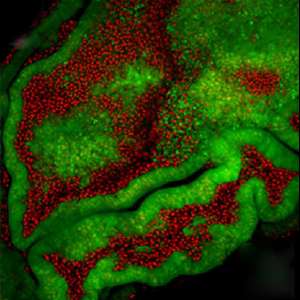Microscope image of an imaginal disc of a developing fruit fly. Credit: Elsevier
Genetically abnormal epithelial cells can interact with genetically normal support cells to help each other proliferate and to drive tumor formation, shows a study by A*STAR researchers using a fruit fly model. Inhibition of the signals that pass between these cells has the potential to block the growth and development of solid tumors.
Solid tumors such as those found in the breast or the lung tend to be highly complex. They can be made of many cell types, which can proliferate at different rates and carry various burdens of cancer-causing genetic alterations. The epidermal growth factor receptor (EGFR) is a protein that is known to be highly expressed in many tumor types and to induce the growth of various tissues.
Hector Herranz based in Stephen Cohen's laboratory at the A*STAR Institute of Molecular and Cell Biology in Singapore induced the overexpression of EGFRs in epithelial cells of a portion of the developing fruit fly called the imaginal disc (see image). Herranz and co-workers discovered that the tumors that arose in that region were made of both the epithelial cells that expressed high levels of EGFRs as well as support cells called mesenchymal cells that had not been genetically modified.
The researchers found that the EGFR-expressing epithelial cells released the proliferation factors Dpp and Wg, and that these factors were required for tumor formation in the fly imaginal disc. By reducing the expression of Dpp or Wg specifically in the epithelial cells or in the mesenchymal cells, they showed that tumor formation required Wg signaling in the epithelial cells, and Dpp signaling in the mesenchymal cells.
In addition, the team found that the genetic elimination of one cell type reduced the proliferation of the other cell type. These findings suggest that crosstalk between genetically abnormal epithelial cells and genetically normal mesenchymal cells could play a role in tumorigenesis, and that blocking this interaction could reduce tumor growth.
Perlecan is a known secreted cofactor for Wg and Dpp signaling. Cohen and his colleagues found that perlecan is secreted by the genetically modified epithelial cells and that it accumulates on the mesenchymal cells. Reducing the expression of perlecan could prevent tumor formation caused by EGFR overexpression in the fly imaginal disc.
"This study identified the signals secreted from the epithelial cells that are driving tumors in this model," explains Cohen. "Our next goal is to identify the signal that comes back from the mesenchymal cells."
More information: Herranz, H., Weng, R. & Cohen, S. M. "Crosstalk between epithelial and mesenchymal tissues in tumorigenesis and imaginal disc development." Current Biology 24, 1476–1484 (2014). dx.doi.org/10.1016/j.cub.2014.05.043
Journal information: Current Biology




















